
How to source developers from Stack Overflow

Top tier software engineers tend to have steady jobs which makes them hard to recruit. How passive are they? According to Stack Overflow 2020 Developer Survey, over 92% of developers are employed at least part-time, with almost 65% saying that they’re either “slightly or very” satisfied with their work. In IT recruitment, there’s very little chance of top tier developers knocking on your door and if that happens, consider yourself lucky. In most cases, however, it takes a great deal of time and effort to hire a software developer. In this post we explain how to source developers from Stack Overflow and how to use the data available on the platform in the recruitment process.
Because majority of developers are passive candidates, recruiters need to be where they like to hang out. HR professionals should use Stack Overflow for three purposes:
- Accessing vital information to leverage during outreach,
- Assessing candidate competency,
- Discovering new leads.
What is Stack Overflow?
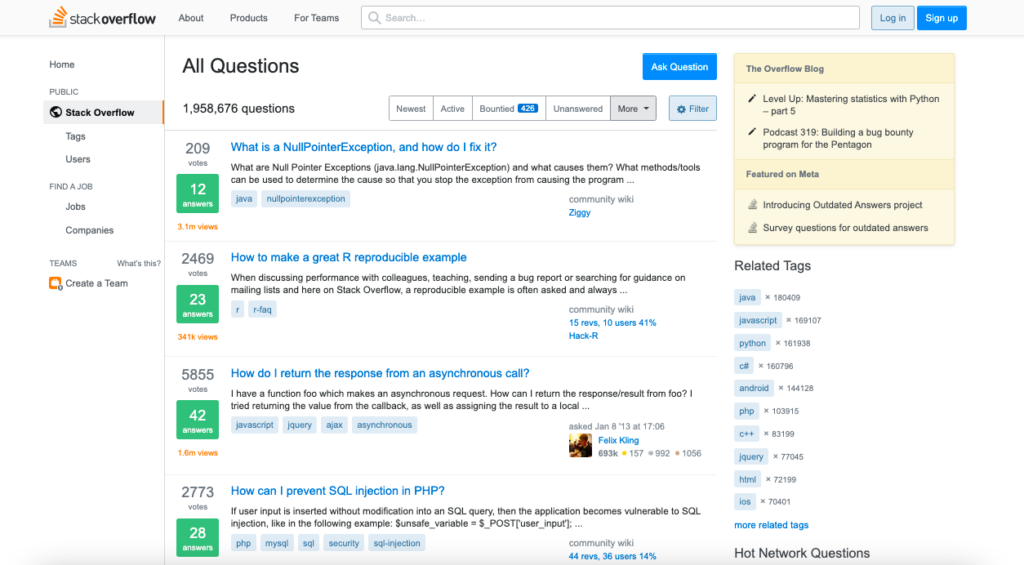
Stack Overflow is a programming Q&A site with technical questions. It is part of a larger group called Stack Exchange Network. The platform aims to solve day to day problems which are posted in the hope of getting an answer from fellow developers. The code posted is fragmentary because it’s designed to deal with a particular issue.
Questions are tagged with programming language or application language which makes them easy to browse. Answers get upvoted and downvoted and people get reputation points for high quality contribution. To keep Stack Overflow a top resource, members also get downgraded for poor answers and silly questions. The person who asked the question gets to choose the best answer for their query.
Paid options for recruiters
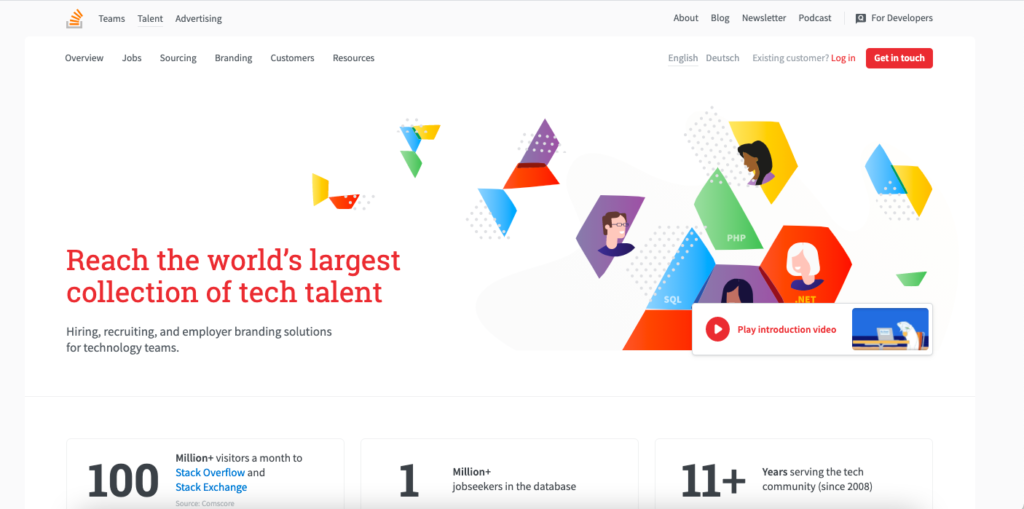
Source: Stack Overflow Talent
Stack Overflow Talent allows you to post listings, search candidates, add your company page to showcase your brand, and many more. I personally like the Candidate Search feature which gives you the opportunity to access Stack Overflow community who voluntarily opted in to be contacted by employers.
I highly recommend using the premium options if you have the budget – this way you access great candidates who are highly relevant to what you’re looking for. If you don’t, there are ways to use Stack Overflow data without allocating funds to it. There is one unbreakable rule: adhere to policy and all will be well.
Jobs are also visible to users of the main platform – here’s what they look like on the homepage:
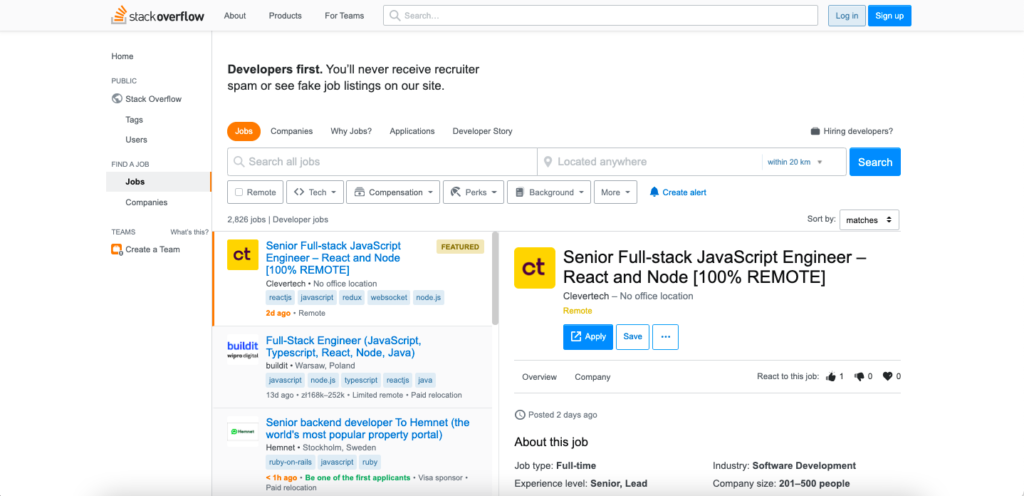
Source: Stack Overflow
What I like most is that job ads appear in relevant sections of the site. As an example, if you look at questions tagged with “mysql”, the job ad you see will correspond to the tag in terms of tech stack.
Policy

Stack Overflow Talent is widely recognized for one of the highest response rates among industry recruitment platforms and they work hard to keep it that way. Recruiters who don’t comply are reported and sending spam is prevented by allowing them to send out only 100 messages at a time. The limit is lifted “as soon as a candidate responds to one of your messages (or if they don’t respond within 7 days), you’ll receive a new message credited back to your account.”
My recommendation is to use Stack Overflow to find people and look at their skills but not for outreach. I would advise to use other means of contact for the sake of getting in touch if you can’t afford the premium option.
Stack Overflow community is very sensitive when it comes to recruiter spam and it is in your best interest to abide by house rules. Stack Overflow works with employers and agencies directly and monitors their activity very closely. I’d like to stress that again: I don’t recommend using the personal messaging feature because you risk getting your privileges revoked.
I urge you to read the Stack Overflow Talent House Rules in full to get a good understanding of what you can and cannot do.
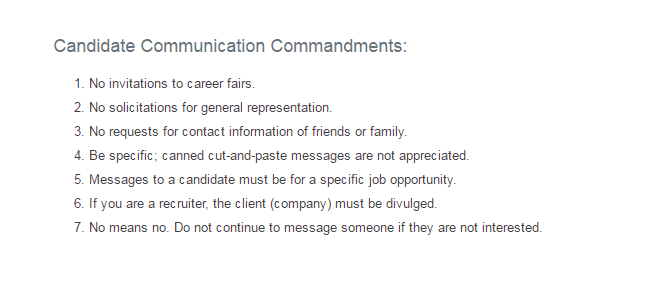
Source: Stack Overflow Talent House Rules
As you can see there are many rules and limitations regarding recruiter activity. Is Stack Overflow worth the hassle? Absolutely. Here’s why.
Why you need Stack Overflow in your (already busy) life
According to a study by Stack Overflow, only 5.3% of developers responded that LinkedIn was their most-used social media platform. This means that if you’re only using LinkedIn to source, you’re missing a huge part of your talent pool.
Also, the reputation gained in Stack Overflow is more testament than CVs. Glen Cathey of Boolean Black Belt says that “while LinkedIn endorsements can be easily attained, Stack Overflow reputation points and badges are relatively hard-earned in comparison.” Granted, not all great devs are active on Stack Overflow, but it’s easy to verify because you can cross reference their profiles which are typically available in their profile information.
The reason you need Stack Overflow in your recruitment process is because it’s an amazing source of information about the candidate which is open to the public. Even without registering, you can browse users and look at their activity. This allows you to not only identify new leads, but also get an idea of the level of expertise of candidates you’ve found elsewhere.
From the technical point of view, I recommend looking at their current activity and when they joined the platform. I know some recruiters send Stack Overflow profile links to their Heads of IT recruitment, but I personally think this slows down work in your company and puts pressure on the already busy employees. What I recommend is a combination of looking at Stack Overflow reputation, running a coding test and inviting candidates to an interview.
As Stack Overflow say themselves in their product tour “this site is all about getting answers. It’s not a discussion forum. There’s no chit-chat.” In theory this means you’re not going to see the personality of the candidate shine through in a very technical and to-the-point Q&A site. However, Stack Overflow community (especially its more senior members) have a reputation for being quite snarky towards newbies who tend to ask simple questions. It’s not uncommon to see a relevant introductory programming question getting closed or receiving “why don’t you google that” answers.
What I recommend is to see whether the software engineers you’re interested in participate in this kind of activity or whether they are more active in threads providing a real learning opportunity.
The anatomy of Stack Overflow user profile
The best way to access data about the developer is to look at their profile which provides a great deal of information.
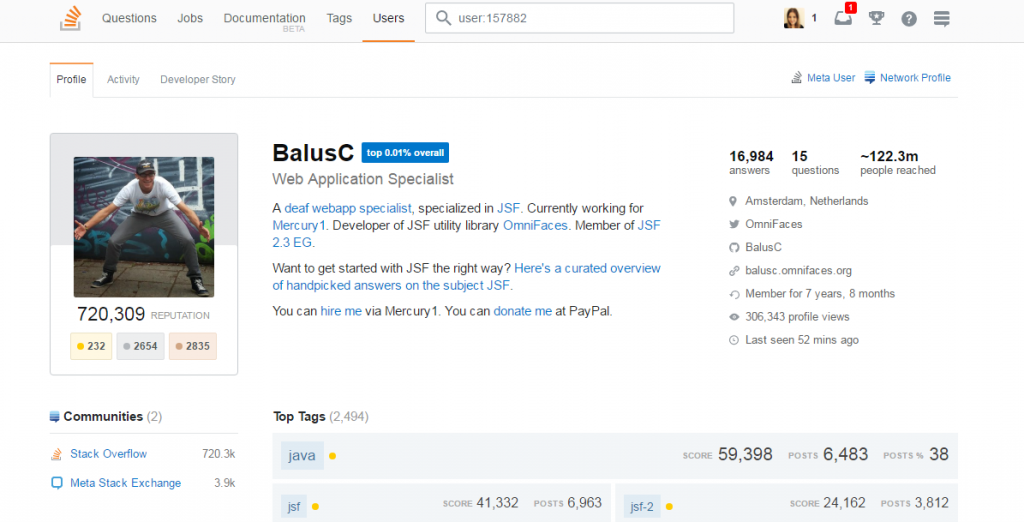
Stack Overflow profiles have these pieces of information available to other users:
- Username,
- Bio,
- Location,
- Website,
- Member since,
- Link to Twitter profile,
- Reputation,
- Question asked,
- Other profiles,
- Profile picture,
- Tags contributed to,
- Information about their activity – i.e recent activity.
Here are some tips on things you can do with that information available to you:
- Learn their real name by visiting their website or Twitter (I also suggest looking up that person on LinkedIn, but they may have no profile in the platform),
- Discover their side projects – they are often provided in the “website” section,
- See what they’re currently working on by means of recently asked questions. According to CEO of Social Talent John Campbell, recent activity is a great ice-breaker for recruiters because it gives you something to talk about in your initial message,
- Their top skills – these are typically reflected by top tags in their profile.
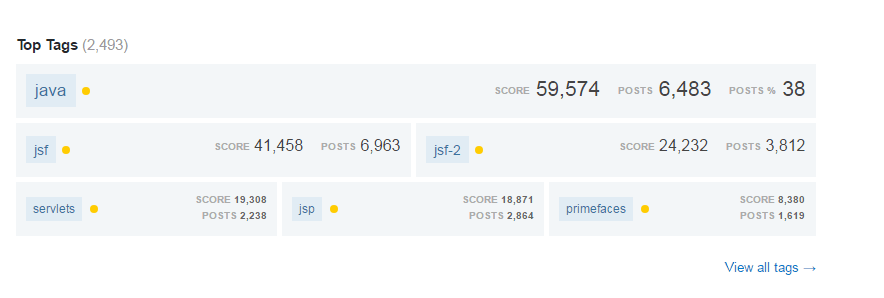 They are also useful because bios are often left blank so they make up for the lack of information there. Read on to learn more about tags – they are so important they got their very own section below),
They are also useful because bios are often left blank so they make up for the lack of information there. Read on to learn more about tags – they are so important they got their very own section below), - Reputation points which you can see here:
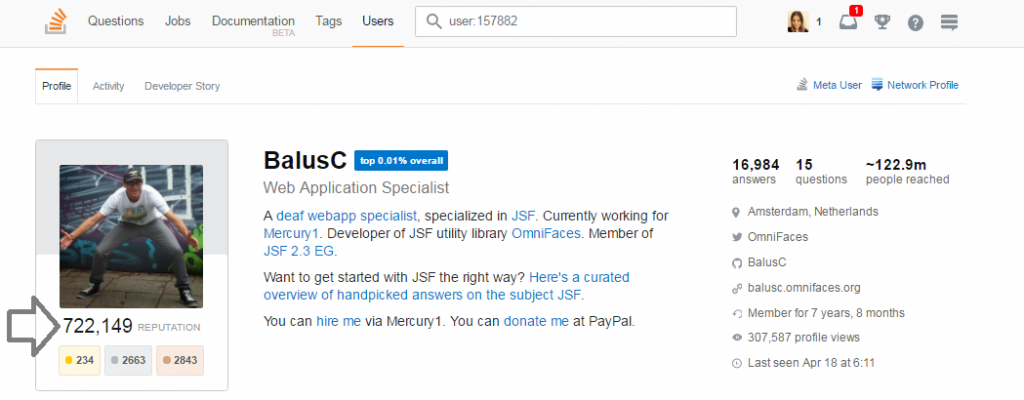
- Badges – The Stack Overflow badge system is actually really complex.There are badges for pretty much everything, including contributing, creating frequently used tags, reorganizing content on the platform, raising helpful flags… You name it. My personal favourite is the “Not a robot” badge which you get for meeting a Stack Overflow employee at an event. You can click any badge representing a given quality (quick to act, conscientious, helpful) which you think would be useful in the position you’re trying to fill and see users who were awarded this badge.
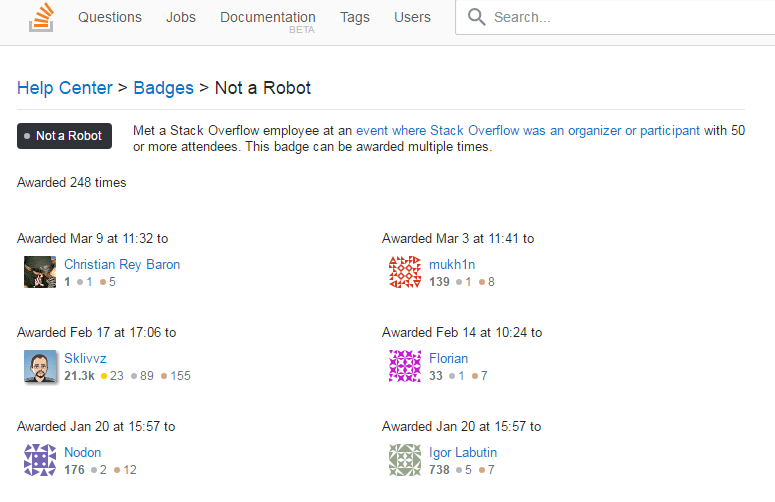
How to use tags & synonyms for sourcing developers from Stack Overflow
Most tech recruiters are not proficient in the skills they are trying to recruit for and that’s where Stack Overflow tags and synonyms come to the rescue. Content posted on Stack Overflow is organized by means of tags which makes it easy to browse. You can use tags in a couple of ways:
1. Discover top skills of any candidate by looking at top tags in their profile,
2. Use Stack Overflow tags synonyms for X-ray searching and iterative searching on other platforms.
There are a number of ways to access Tags and I’d like to show you my favourite one:
- Click “Tags” in the side bar menu,
- In the “Tags” section, enter your keyword in the search box to look for any required skill (I looked for “python”). Click the master tag appearing at the top of the list,
- You will see questions tagged with your tag. Click “Synonyms” in the menu,
- You can now see the synonyms to be used in your searches.
- You can also use related tags to run iterative searches.
What I like so much about Stack Overflow tags is that they can be used outside of the platform and they can save you a lot of Googling. Remember Glen Cathey’s iterative search we discussed in “How to source software developers from LinkedIn”?
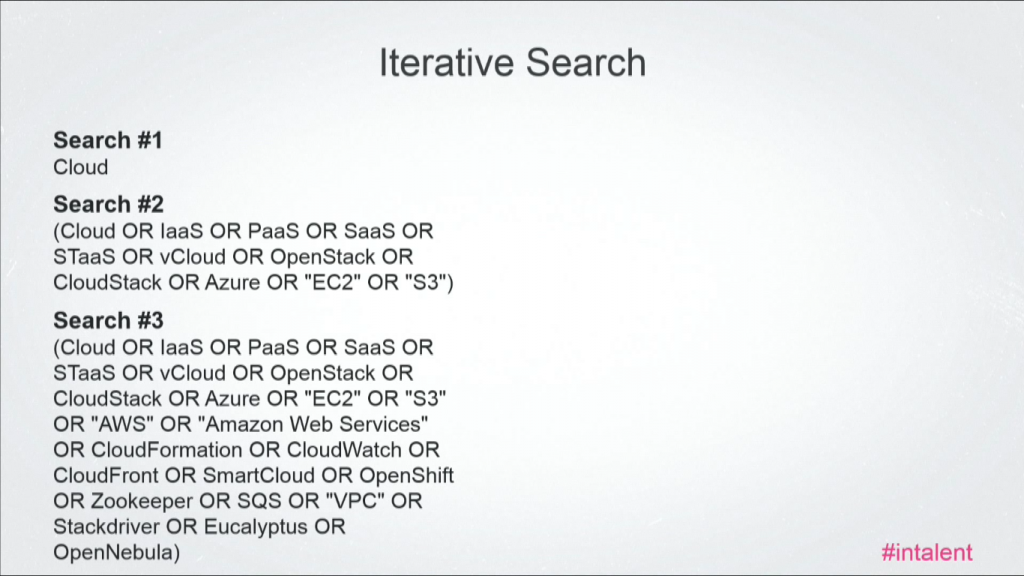
Source: YouTube
Glen said he uses Google to see if there’s a correlation between the skills but you can also consult Stack Overflow tags, synonyms and related tags for support.
How to cross reference profiles?
In user profiles, you can see a list of personal details users choose to disclose, like their Twitter, GitHub profile and website. You can try to Google the username and in many cases this will help. Another way is to go to the website provided and check the About section or its whois data.
Why sourcing from Stack Overflow and LinkedIn is different
Let’s just say that as a tech recruiter, you might not feel particularly welcome on Stack Overflow. Why? Here’s the first email you receive when you register:
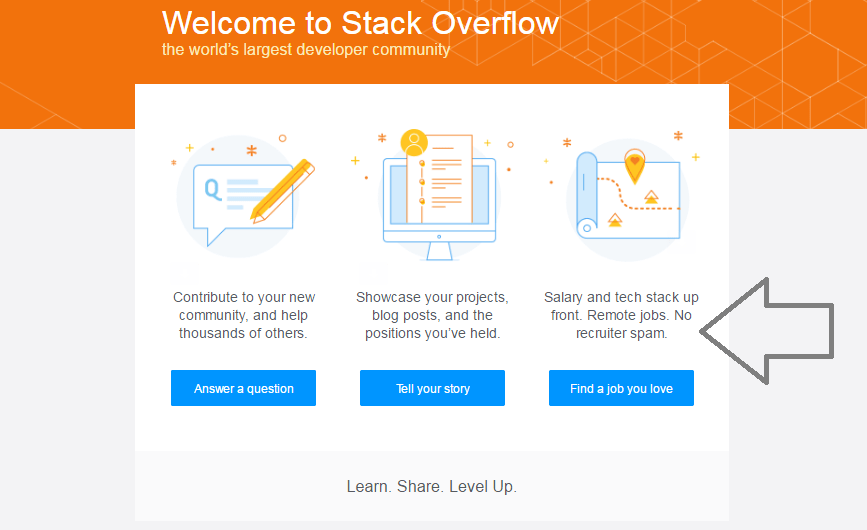
Notice the “no recruiter spam” promise? It’s right there, in the first message they’re sending, which gives you an idea of the current state of IT hiring.
The header of the “Jobs” section says “No recruiter spam”, too.
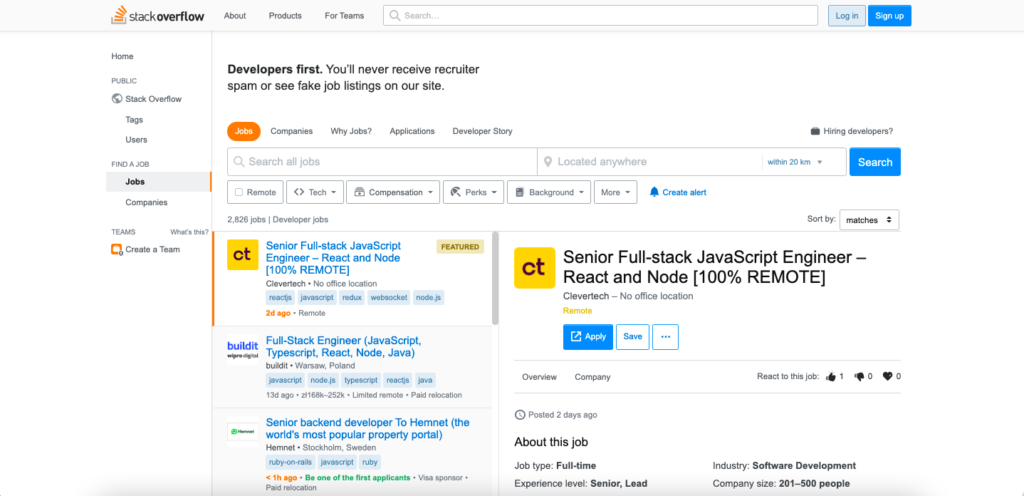
Source: Stack Overflow
Stack Overflow actually allows recruiters as long as they abide by the rules:
- Disclose the company you’re recruiting for,
- Recruit for a specific role (no vague “I have a couple of opportunities”),
- Make sure the role is relevant to candidate’s interests,
- Provide background info.
The copy on their site and in the welcome email tells you something very important: as a recruiter, you have to be really good at your job. They hate sloppy recruiting there and they have the right to do so.
Think about it this way -LinkedIn is centered around career opportunities and building a strong professional image so the presence of recruiters is natural and solicited. Stack Overflow is a developer Q&A site designed for solving problems and learning, neither of which is facilitated through recruiters joining the platform. Now, I’m going to make an educated guess and say that if more seasoned Stack Overflow users tend to be hostile towards beginners, they’re probably not very open to people who:
- Can’t code and can’t contribute as a consequence,
- Come from a group which constantly gets bad rep.
In other words, LinkedIn is a much more natural environment for recruiters because they get to build their personal brand there, publish content and generally do things to present themselves in a positive way. Their activity on LinkedIn is therefore twofold: they get to build their personal brand and look for candidates to fill open positions. On Stack Overflow that’s not really the case because the only reason you’re there is to recruit. You’re basically a non-developer in a developer community.
I’ve come across this interesting Quora thread discussing the experience with Stack Overflow Jobs. The expectations are really high. Chris Jester-Young with 204k+ rep on Stack Overflow says that when it comes to messages from recruiters on Stack Overflow Careers, LinkedIn, and email “the ones I really pay attention to are ones written by “real” people, like programmers and Engineering VPs and CTOs (and in one recent case, CEO).”
Again, that only tells you this: average doesn’t cut it anymore, you need to educate yourself to become an exceptional tech recruiter.
You also need to know what software engineers want and offer that to them. Here are the top two nuggets of information from the 2020 Stack Overflow Developer Landscape:
- Languages they’ll work with (51.3%), office environment/company culture (44.5%), and flex time (43.9%) are the top three most important aspects of a new job opportunity.
Better salary (70%), desire to work with new technologies (58.5%), curiosity about other offers (57.1 %) are the top three reasons for developers searching for new jobs.
Best practices
- Encourage your team to be active and contribute.Your employees are like your storefront – if they provide valuable contributions and are happy to represent your brand, they are likely to attract the sort of attention you need,
- Get exposure for your tech brand.Your company page allows you to share updates about your brand and present it to potential candidates. Remember what developers care about at work? Make sure the content you present there is timely and relevant to their interests. Remember to always list your tech stack.
Is it scalable?
Are you going to get hundreds of leads and reply messages? Probably not, and that’s a good thing. You don’t want to spam people who don’t fit the job description, right?
Thanks to the information available on Stack Overflow, you can target the right person. I am sure a lot of the recruiters mentioned in the survey looked at Stack Overflow and GitHub activity of their candidates during the recruitment cycle. I also believe that when it comes to sourcing from Stack Overflow, the quality makes up for the quantity.
X-ray searching Stack Overflow
…is blocked to a large extent. I know, it hurts.

Some searches which used to work like this one from Boolean Black Belt no longer return results:
Others do work – for example, you can see all users in Google site:stackoverflow.com/users or search users with a given skill:
site:stackoverflow.com/users jdk OR jre OR j2se OR java (source: Sourcing & Recruitment Info)
No need for tissues and ice cream therapy (Haagen Dazs for the win though, in case you ever need ice cream therapy). There’s another way to find what you need.
Enter Stack Exchange Data Explorer, in all its free glory.
Stack Exchange Data Explorer
Luckily for us, Stack Overflow data is available for free on Stack Exchange Data Explorer. Developer Shane Gryzko wrote a very helpful post where he talks about how you can use the data explorer.
Shane recommends using an SQL query he prepared himself. All you need to do is type in any location and any valid tag in the search menu:
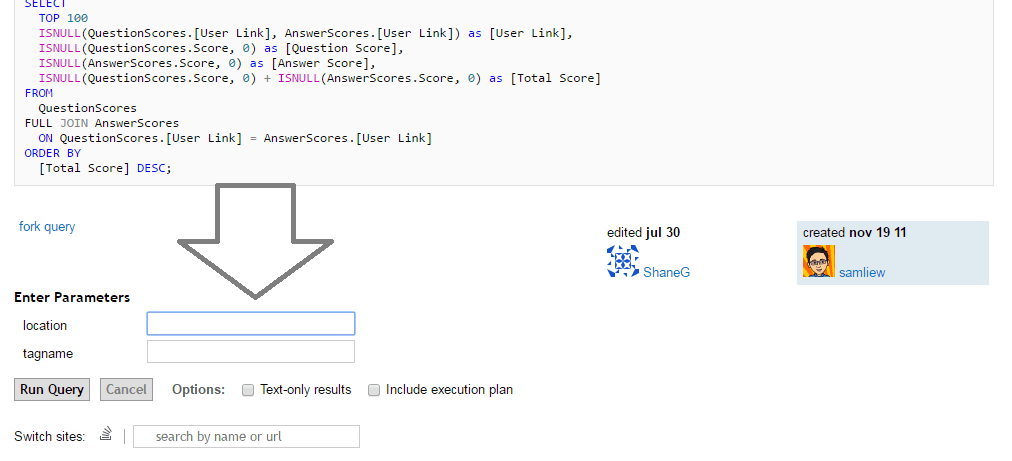
The results you get are clickable so you can access profile users directly from the tool.

Remember to look for means of contacting devs from their Stack Overflow profile but try not to do that in Stack Overflow due to house policy rules.
Conclusion
The game is too serious for you to go around bullshitting people about having “a couple of great opportunities”. Given the level of competition, you need to know all the research published about your target group. You need to know it by heart and draw conclusions. There’s no more room for guessing or making up for the quality of leads with bulk emails, especially on Stack Overflow. Think before you act – as a recruiter, it’s really easy to get your privileges revoked and your reputation tarnished.
Know what developers want and appeal to their needs. Remember that in most cases, you can’t really do that without a strong employer brand. As Hagi Trinh rightly argues, “What you sell is interesting challenges and recognition, in the form of employer brand”.
It’s time to get serious about recruiting developers. Are you ready?




